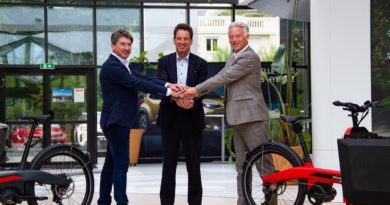Retail training: The battle between targets and what customers need
With retail footfall down, the pressure is on for in-store sales teams. Retail training exec Jake Wiid discusses targets vs customer needs…
There’s no denying the struggles independent bike shops, and even their chain store counterparts, are having. It’s a UK-wide problem for anyone in retail with a bricks and mortar shop front.
Cycling businesses are having to diversify in the same way all high street stores are having to – introducing coffee shops, repair workshops, promoting local cycling and utilising local social media. So when a potential customer does walk through the door you want them to stay and spend. And that’s where training providers come into their own.
Jake Wiid has worked his way up from retail store management, through sales rep to retail training exec. His work with outdoor lifestyle marketing agency, Spring PR, means he now works with top brands including Polartec – the innovative fabric manufacturer making a name for itself in the cycling world.
“With foot-fall down in high street retail, maximising every opportunity is more important than ever,” says Wiid. “But this doesn’t mean selling as much as possible to get the short-term win. “I experience good and terrible sales people. Judging this was not on the value of their ticket items but on the care, compassion and, more importantly, their understanding of the customers’ needs.
“So many retail teams have a financial target at the front of their minds when a customer walks in the store. It’s drilled down each day and often they hear, but don’t listen to, the customers’ needs. The best teams hit their targets without a thought.”
Being an ingredient brand, Polartec very much benefits from investment in training. Its wide range of technical fabrics offer different features for cyclists and their benefits need to be explained to be seen. And to be explained to a customer, they need to be understood by the sales person.
As Wiid can attest to: “Anyone can sell a product to someone else, but the key is to know that product and be honest. One company I ‘rep’d’ for spent more money on their training and seeding campaign than they did on their sales campaign and the results were impressive. However, some retailers see training as a ‘chore’ or a ‘distraction’ from selling, whereas this should be seen as the key to selling.”
So, what are Jake’s top five tips?
- Knowledge– with the digital age among us customers are more savvy and highly researched. They expect to come to store for that first-hand knowledge and find out how a product or garment actually performs in the field or on the trail. Sales people who have used their products find the customer trusts them.
- Passion – You can’t teach this, you feel this. As fluffy as this may sound, if a customer talks to someone who cares, they will buy. Apple is a great example of this, their staff care, are highly trained but more than that, they are passionate.
- Upselling– Every good sales person can upsell the product if they listen. Not every customer can be upsold to, but most can. Shoes need socks. Bikes often need helmets. If you focus your time on listening and not talking, you can upsell 90 per cent of the time. People come to the store to spend money, let’s help them do that.
- Time and personal service– Everyone likes to feel special or unique, just because they are buying a pair of socks from a high street retailer should have no bearing on how they are treated. If you can give every customer the Virgin Upper Class experience every time, regardless of spend, they will return. Even better get their name and use it… just don’t get it wrong!
- Added extras – Most wholesalers have freebies, which as store staff we find a massive perk of the job. If you can get some of these freebies set aside and give them to selected customers as a thank you, they will return and buy more.
In summary and in the words of Richard Branson: “Train people well enough so they can leave, treat them well enough, so they don’t want to.”



